Every year, over two million cars leave Michigan’s assembly lines. This makes the state a key player in Automotive Parts production. It also creates a steady need for precise CNC machining.
The area’s history of car innovation and the need for top-notch parts drive this demand. We use advanced equipment to meet strict standards. We work with local suppliers to make parts faster, last longer, and meet quality standards for big brands like Ford and General Motors.
Key Takeaways
- Michigan leads the nation in vehicle output, driving CNC growth
- Close tolerances keep Automotive Parts consistent across models
- Partnerships with local suppliers bolster speed and reliability
- Advanced equipment enhances part performance and lifespan
- Legacy of automotive innovation boosts demand for CNC expertise
Overview of Michigan’s Manufacturing Landscape
We see Michigan as a key player in industrial growth. Its rich history in metalworking has led to steady progress in Precision CNC Machining. Top research centers and training programs help our workers improve and achieve consistent results.
We use top-notch facilities with advanced tools and automation. This setup helps us work faster and produce higher quality. We also work closely with top CNC machining services to stay updated with the latest in manufacturing.
Michigan’s drive for innovation shapes our approach. We focus on technical accuracy and solving complex problems to meet tough automotive standards. By blending old metal skills with new methods, we create reliable solutions. Our team is committed to excellence, honoring Michigan’s legacy while aiming for future success in Precision CNC Machining.
Why Automotive Production Is Booming in the Great Lakes State
Vehicle assembly and engineering are growing fast in this area. Big names like Ford and General Motors keep improving. This helps Michigan’s manufacturing, creates jobs, and advances technology.
Strong partnerships are key in the automotive field. These teams work together for quality, speed, and consistency. Their shared resources and skills make the network stronger.
The Role of Tier Suppliers
Tier suppliers are crucial for car makers. They provide parts like engines and electronics. Their expertise and quick service help Michigan’s manufacturing run smoother.
| Tier Level | Responsibilities | Typical Products |
|---|---|---|
| Tier 1 | Sub-assemblies for OEMs | Body systems, electronics |
| Tier 2 | Specialized parts for Tier 1 | Machined and forged components |
| Tier 3 | Raw materials and near-finished goods | Basic castings, metals |
Economic Incentives for Automotive Companies
Michigan offers tax breaks and grants to attract car makers. These incentives make it easier for companies to invest. This keeps Michigan at the forefront of car innovation.
Automotive Parts in Demand
There’s a big need for parts that are strong and precise. We focus on making components that work well under heavy loads. Modern cars need parts that are both strong and light, made with advanced materials.
Parts like engine brackets and suspension assemblies need to be very durable. We use the latest technology to make these parts efficiently. CNC Machined Components help us meet the needs of today’s and tomorrow’s cars. Our team uses automation to keep everything precise and efficient.
Precision-Engineered Components
We use advanced machines to make parts with almost no error. This is key for engines that need to be very accurate. Every part we make meets high standards.
Innovations in Drivetrain Systems
We create drivetrain products with top-notch materials and design. CNC Machined Components are crucial for these systems. They ensure every part, like gears and shafts, can handle tough conditions without losing quality.
Importance of CNC Precision in the Automotive Sector
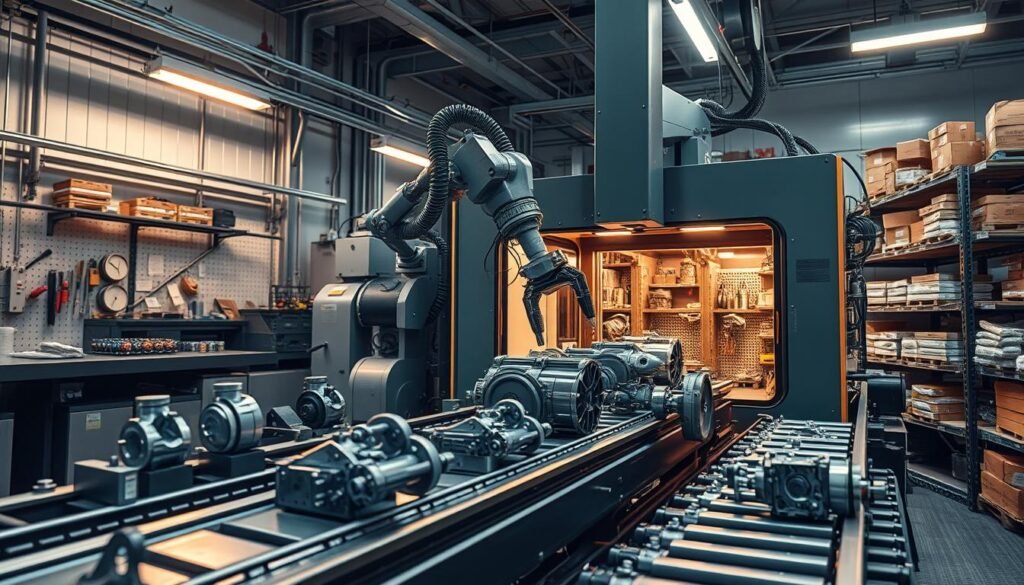
Accurate machining is key in the Automotive Supply Chain. It ensures every part meets high standards. With tight tolerances and advanced software, we can create complex shapes quickly and reliably.
Our use of live tooling and automated quality checks gives us fast feedback. This helps us spot and fix any issues right away. It’s how we make sure parts for electric motors and transmissions are top-notch, saving weight and energy.
Having parts ready just in time is crucial. CNC precision helps us deliver on time and with fewer mistakes. This reliability builds strong partnerships throughout the Automotive Supply Chain, supporting future advancements.
Key CNC Machining Technologies Transforming the Industry
We see big steps forward in precision tools and software. Our machines are now connected to systems that predict when they might need repairs. This means we can fix problems before they cause delays.
Multi-Axis Milling
Multi-axis milling helps us work on complex shapes on engine parts and more. It can handle many surfaces at once, ensuring accuracy. Plus, it cuts down on the time needed for setup, making our work faster and more reliable.
High-Speed Turning
High-speed turning boosts our efficiency and keeps quality high. Machines feed material quickly, cutting down on idle time. This keeps our work flowing smoothly and helps us stay competitive.
Meeting Strict Automotive Quality Standards
We follow strict rules to make sure every part is perfect. Our checks use digital tools to measure each part accurately. This is key for parts trusted by top carmakers. Every step is aimed at making parts reliable and safe.
Quality control includes tests with coordinated measuring machines (CMMs) and tracking data in real-time with statistical process control (SPC). We follow IATF 16949 rules by doing risk analysis and FMEA reviews. This helps us meet industry standards.
- Dedicated metrology labs for advanced analyses
- Traceable lot control for full accountability
- Regular audits to verify accurate tolerances
Our methods ensure parts meet strict standards and avoid recalls. We keep improving our methods for consistent quality in every batch.
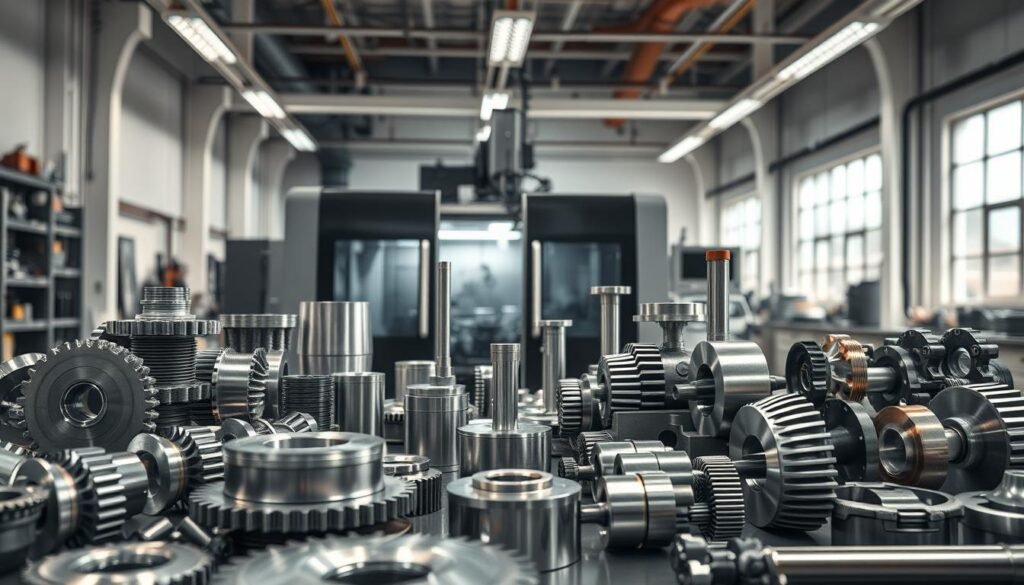
How Michigan’s Skilled Workforce Drives CNC Advancements
We’re proud of our operators and engineers. They fine-tune advanced processes for every new innovation. Each team member brings their own industry-specific knowledge to our projects. This ensures we meet rigorous standards and keep workflows smooth.
We work closely with schools like Henry Ford College and Grand Rapids Community College. They help us stay at the forefront of innovation. Students learn in the classroom and get hands-on experience through internships. This prepares them to work with high-end equipment.
Specialized Training Programs
Our workforce gets specialized training that sharpens both analytical and practical skills. Students learn a lot about Precision CNC Machining. They become familiar with multi-axis setups and automated control systems.
- Hands-on labs give learners real-world experience.
- Collaborative research projects help solve practical problems.
- Industry certifications prove they’re skilled in new machining methods.
This approach makes us more productive and speeds up development. We quickly adapt to changing automotive needs. Our well-trained teams excel at using new techniques. Our ongoing investment in education keeps Michigan at the top of automotive innovation.
Cost-Effectiveness and ROI for Automotive Suppliers
We know that small improvements in efficiency can make a big difference. When suppliers streamline their production and bring processes together, they save time and materials. Our team has seen how precise machining cuts down on waste, leading to better returns on each part.
Working with Michigan Manufacturing brings real benefits. Faster delivery times in Detroit save on transportation costs. A skilled team can set up complex CNC machines quickly, reducing the time it takes to make parts. These changes have consistently improved the return on investment.
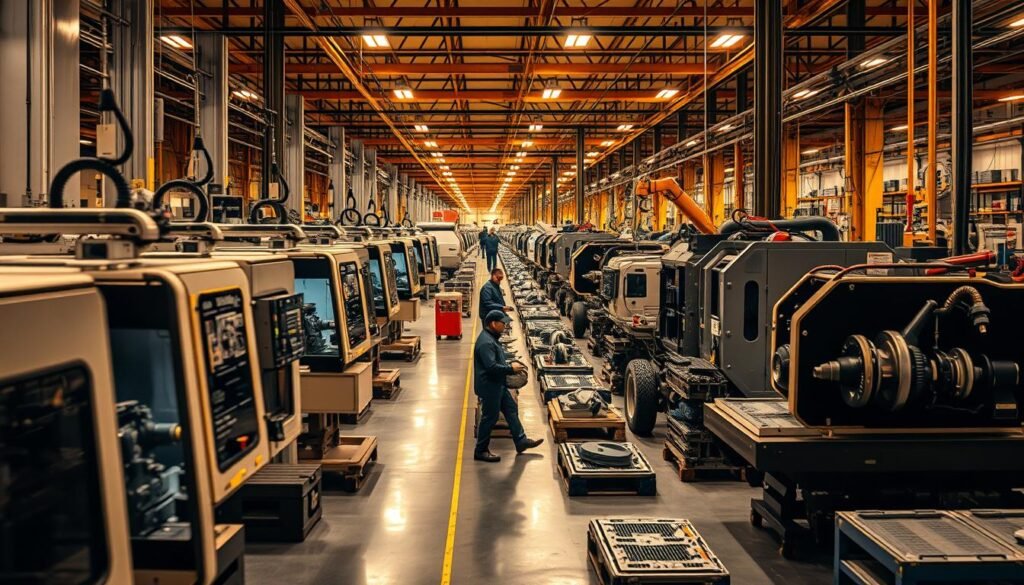
Key benefits include:
- Shorter lead times thanks to reliable infrastructure
- Lower logistical costs from local supply chains
- Smarter collaboration with experienced engineering teams
Strong supplier relationships and advanced equipment create a solid base for success. This is true for both local companies and global automakers looking for lasting value in their operations.
The Role of Material Selection in Automotive Manufacturing
We focus on matching the right materials with exact machining methods. Our goal is to make parts that boost car performance, save fuel, and last long. Each material helps make cars lighter and keeps them strong under tough conditions.
We carefully pick materials to meet today’s production needs. By using advanced tools and coolants, we get consistent quality. This method cuts down on waste and improves performance, showing our dedication to smart engineering.
Metal Alloys for Engine Components
Aluminum alloys make cars lighter without losing strength. They help manage heat, extend engine life, and improve power. Steel blends are also key for parts needing extra toughness and durability.
Lightweight Composites for Body Parts
Carbon-fiber and similar materials make cars lighter and more agile. They simplify assembly and enhance handling. This shows our commitment to creating parts that meet today’s car needs.
Prototyping and Rapid Production in Michigan’s Automotive Sector
We speed up product development by mixing additive methods with CNC finishing. This quick method turns rough ideas into working parts fast. Michigan’s R&D facilities help make engine prototypes, battery modules, and body parts quickly. This makes our Automotive Supply Chain faster and more flexible.
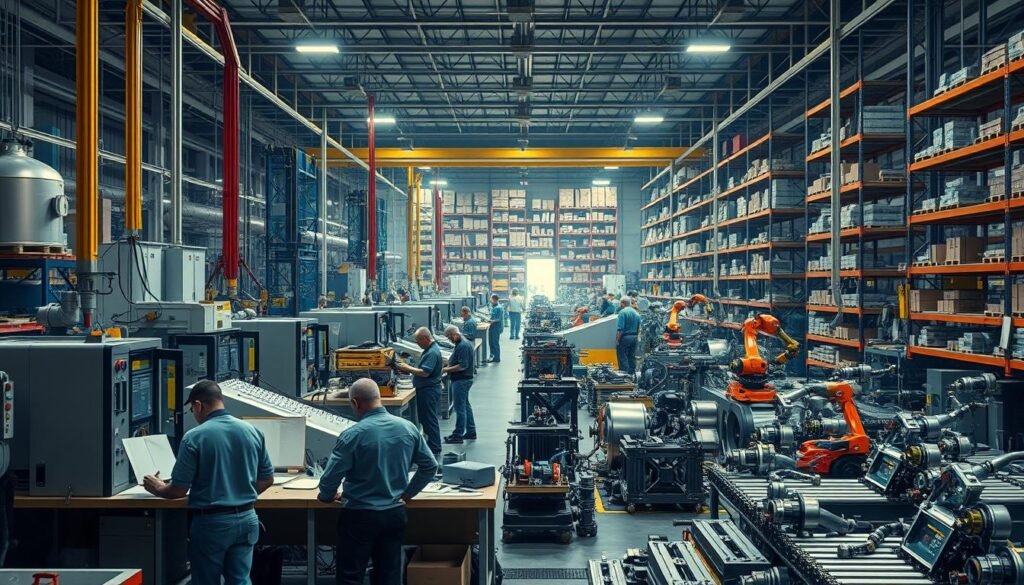
3-Dimensional Services Group, covering over half a million square feet in Southeast Michigan, shows how fast prototyping can be. They can turn complex CAD drawings into real parts in about eight weeks. We count on this quickness to meet new design needs. Our local partnerships help us get even better at this. Check out our
rapid prototyping resource for more on fast production.
- Idea Validation: Hybrid additive and CNC modeling
- Precision Testing: Aligning material properties with final parts
- Production Transition: Seamless scaling into full runs
| Key Phase | Turnaround Benefit |
|---|---|
| Initial Mock-Up | Visual confirmation within days |
| CNC Refinement | Functional prototypes that match final specs |
| Scale-Up | Rapid shift to mass production |
Regulatory Considerations for CNC Machined Automotive Parts
We follow strict rules to ensure our work is safe and good for the planet. Our modern facilities use the latest technology to keep quality high and waste low. This approach helps us save energy, cut down on scrap, and lower costs.
We take steps to protect our workers and the community around us. We manage fluids carefully to prevent pollution. We also recycle metal chips and other materials, showing our commitment to the environment.
This way, we stay efficient and gain trust from car makers looking for green options.
Ensuring EPA Compliance
We work closely with the Environmental Protection Agency to meet tough standards. Our efforts include:
- Using closed-loop coolant systems to cut down on harmful releases
- Following strict rules for disposing of cutting fluids and finishing agents
- Keeping scrap metal safe for recycling
By doing this, we show our strong commitment to safety and caring for the environment.
Future Trends Impacting Automotive CNC Machining
We see a big change coming with more electric cars and self-driving tech. These need parts made with super precision. Michigan Manufacturing is leading the way in using new materials and methods.
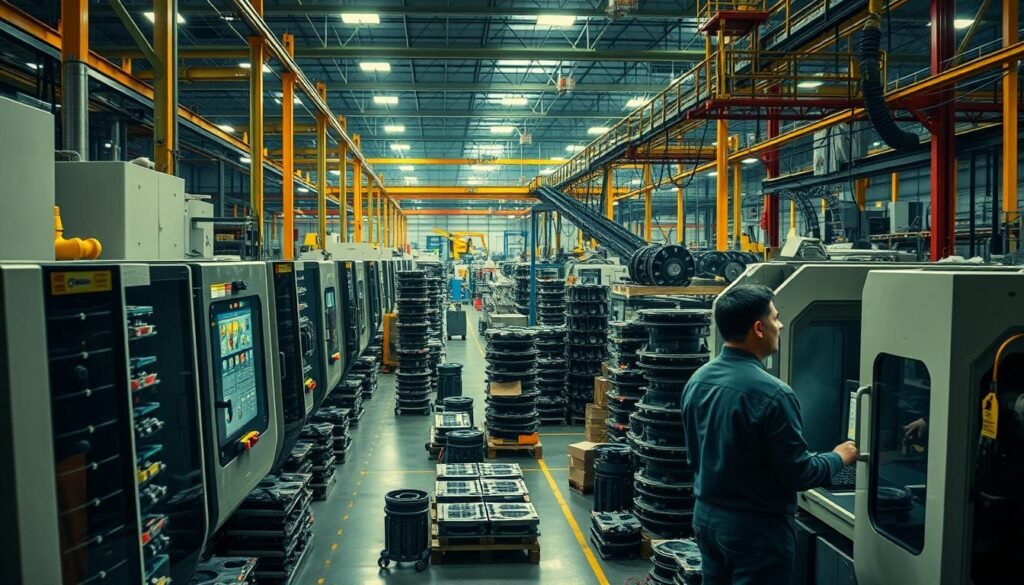
There’s a big push for tools that predict when machines need fixing. This is key to keeping up with tight schedules. Cloud-based systems are making it easier for everyone to work together and update designs fast.
- Advanced milling for ultralight chassis
- Specialized tooling for autonomous vehicle parts
- Secure data links for remote monitoring
A spokesperson from Ford stated, “CNC-based processes remain essential for producing next-generation vehicles and achieving sustainability goals.”
Collaboration Between OEMs and Local Machine Shops
We focus on strong partnerships between big car makers like Ford and local machine shops in Michigan. Being close together makes it easier to move parts and change designs fast. This teamwork leads to making lots of parts with high precision and quick delivery.
When machine shops send parts quickly, we all win. It helps us work better together and shows we’re true experts. We can also handle sudden changes fast, making sure every part is just right for CNC Machined Components.
Streamlined Supply Chains
Working together locally makes supply chains better. We talk directly with engineers to make things run smoothly. It’s easier to get materials and update tools when we’re close.
Real-Time Quality Control
We check parts carefully at every step. We fix any issues right away and adjust tools before problems get worse. This keeps our parts reliable and cuts down on waste.
| Key Factor | Benefit |
|---|---|
| Proximity | Lower transportation costs and rapid response to design changes |
| Continuous Communication | Real-time collaboration ensures consistent quality and reduced rework |
| Localized Supply Chain | Improved lead times and stronger trust between OEMs and machine shops |
Sustainability and Eco-Friendly Manufacturing Practices
We aim to cut down our carbon footprint in the Automotive Supply Chain. Our places use energy-saving CNC systems. These systems cut paths efficiently, reducing waste and power use.
Each cycle cuts costs and helps save resources for the long run.
We work with local partners to reuse scrap materials. This cuts down on the need for new metal and lowers emissions. The recycled materials fit well with our advanced processes, keeping quality high and the environment safe.
We use robots to make production smoother, improving accuracy and cutting down on human error. This effort makes our Automotive Supply Chain strong. It meets the growing need for eco-friendly practices and boosts confidence in Michigan’s manufacturing scene.
Mekalite’s Customized CNC Solutions for Automotive Applications
At Mekalite, we create special solutions for cars, focusing on precision, speed, and saving money. Our goal is to meet the need for dependable parts. These parts power engines and make chassis assembly smoother. We use Shenzhen’s strong infrastructure to keep our work efficient.
Advanced Equipment in Shenzhen
We use 3-axis, 4-axis, and 5-axis CNC machines for making engine and drivetrain parts. Our CNC machining services in China use the best metals and composites. This ensures each part meets strict standards. We check each batch carefully to ensure it works well.
- Precision-engineered components for engines and transmissions
- Multi-axis milling for complex geometries
- Rapid scaling from prototypes to production
Expert Engineers Delivering Reliability
We have a team of skilled professionals who bring technical know-how and creative ideas. Our experts refine every design, using materials like aluminum, stainless steel, and special alloys. This method cuts down production time and ensures quality. We’re known for our quick service, making us great for both small and big orders.
Conclusion
Michigan’s auto industry is looking bright. Skilled workers, cutting-edge machines, and support programs are making better parts. These parts will power the next cars and trucks.
This setup encourages new ideas and better ways to work. It helps car makers stay ahead in the game.
At Mekalite, we’re ready to help. Our Shenzhen facility has top-notch gear and skilled engineers. They make parts that meet the highest standards for cars around the world.
We aim to make parts that work better and keep supply chains running smoothly. This is key in today’s fast market.
Want to improve your manufacturing? Contact us for custom CNC services. We’re here to help Michigan’s auto industry grow. Together, we can make mobility better with precise, efficient parts.
FAQ
How does Michigan’s automotive heritage drive demand for advanced CNC machining?
Michigan’s long history in making cars makes us need better CNC machines. The state wants fast, precise, and consistent parts. So, we use advanced tools and systems to meet these needs.
Why are Tier suppliers crucial for CNC Machined Components in the automotive industry?
Tier suppliers are key in Michigan’s car-making world. They make important parts quickly. We work hard to make sure these parts are accurate and on time.
Which quality standards guide the CNC machining of automotive parts?
We follow IATF 16949 and use special tools to check our work. This way, we make sure every part is perfect. It’s all about meeting high standards in the car industry.
What types of automotive components demand high-precision CNC techniques?
Parts like drivetrain components, engine blocks, and suspension parts need to be very precise. We use special CNC methods to make them strong and reliable. This ensures they work well in different cars.
How do multi-axis milling and high-speed turning benefit Michigan’s automotive suppliers?
Multi-axis milling makes complex shapes easily, like for turbochargers and battery boxes. High-speed turning makes production faster without losing quality. Both help us work faster and save money.
In what ways does CNC precision support environmental compliance?
CNC machining uses less material and energy, which is good for the environment. We also use closed-loop coolant systems and recycle metal. This helps reduce our impact on the planet.
How do Michigan’s specialized training programs enhance CNC manufacturing?
Local schools train skilled workers in CNC. They learn about programming, complex operations, and monitoring. This helps us stay ahead in making parts.
What role does predictive maintenance play in automotive CNC machining?
Predictive maintenance uses data to spot problems before they happen. This keeps our machines running smoothly. It helps us keep up with car industry demands.
Why are lightweight materials integral to modern vehicles and CNC processes?
Modern cars use lighter materials like aluminum and carbon fiber to save fuel. We use CNC to work with these materials. This makes cars more efficient and eco-friendly.
How does Mekalite address both rapid prototyping and full-scale production?
We use 3D printing for quick models and CNC for final parts. This way, we can test and make parts fast. It helps us move from idea to production quickly.




